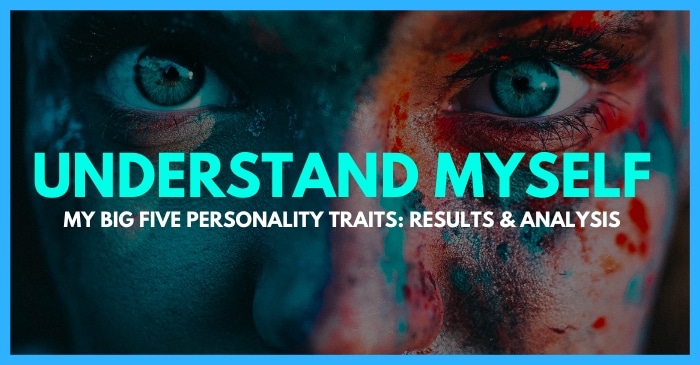Why I Took the Big Five Personality Trait Assessment
“Know thyself” —Oracle Delphi
I first heard about the Big Five personality traits from listening to Professor Jordan Peterson, a clinical psychologist whose Biblical lectures completely changed my perspective on the Bible. After a few close friends took his Understand Myself Assessment and reported interesting results, I finally decided to give it a go myself.
I hoped that by taking the test, I might gain some insight toward understanding who I am and what my purpose is in life. While I believe I’m capable of transformation, I’ve also come to accept some aspects of my life as, more or less, fixed. My personality is one of these aspects.
“Even if you’re fully enlightened, you still have a personality.” —Leo Gura
Much of my personality seems to stay with me no matter how much I meditate or how deeply I think I’ve changed as a person. I keep holding onto these old parts of myself. It’s made me fascinated with my personality, and instead of wanting to change it, I seek to better understand it. And when it comes to understanding personality, there may be no more direct path than the perspective of psychology. That’s what intrigued me about taking this assessment.
What Are The Big Five Personality Traits?
For those of you who might not know, the Big Five Aspect Scale is a 100-item, 10-minute, personality measure which scores you on the Five Dimensions of Personality and their Ten Aspects:
* Agreeableness: Compassion and Politeness
* Conscientiousness: Industriousness and Orderliness
* Extraversion: Enthusiasm and Assertiveness
* Neuroticism: Withdrawal and Volatility
* Openness to Experience: Intellect and Openness
So, without further adieu, here were my personality results:
My Results
* Agreeableness (Compassion + Politeness) = Moderately High (61st percentile)
* Conscientiousness (Industriousness + Orderliness) = Moderately High (66th percentile)
* Extraversion (Enthusiasm + Assertiveness) = Moderately High (72nd percentile)
* Neuroticism (Withdrawal + Volatility) = Low (11th percentile)
* Openness to Experience (Openness + Intellect) = High (80th percentile)
My Analysis
I can’t claim this personality test completely changed my life, but it did help awaken me to new perspectives. My results, which I felt matched my personality fairly accurately, felt like a necessary step in the right direction and one piece to a much greater puzzle.
Specifically, I agreed strongly with my results for three of the dimensions (Agreeableness, Conscientiousness, Opennness) while two of the results (Extraversion & Neuroticism) left me feeling a bit confused. They didn’t match the stories I had imagined about myself. I just hadn’t considered myself as someone extraverted and low in neuroticism.
I’m also not sure how to rectify my 80th percentile scores on Orderliness and Openness. To rank highly in both aspects seems to be a contradiction. Perhaps multiple personalities live inside me and vie for power in various domains and circumstances in my life.
Basically, if I were to select where I stood for myself, the results would have been much different. I guess that’s the point of taking an test. It’s objective, and that perspective is useful in order to step outside my stories and see myself in a new light.
I found it especially useful to see the percentiles of how my personality compares to the average person since results are compared across all age ranges and sexes. I don’t see high and low rankings so much as strengths or weaknesses but rather simply as colors on a canvas that make up a piece of art.
No online assessment will be perfect. There’s so much nuance involved in personality. I feel like mine is completely contextual and situational, which is difficult or impossible to model for.
All in all, I would recommend the test to others. If anything, it’s a great topic of conversation among friends if they take it too. The test is quick, easy, insightful and there’s low barriers to entry (as of my writing this post, you can take your assessment for $10).
If you decide to take it, I’d love to hear what you thought of your results in the comments below.
For those interested in hearing more about my results and in-depth analysis of each of my Big Five Personality Traits assessment, feel free to keep scrolling down.
My Detailed Results & In-Depth Analysis:
This section includes my results from the test.
*Items marked in italics are my personal commentary and initial reactions.
Agreeableness = Moderately High (61st percentile)

People high in agreeableness are nice: compliant, nurturing, kind, naively trusting and conciliatory. However, because of their tendency to avoid conflict, they often dissemble and hide what they think.
*Yep. I am the master of hiding what I think, especially if I think conflict will come because of it.
People with moderately high levels of agreeableness are seen by others as cooperative, warm and considerate. They are likely to look for and even sometimes to see the best in others, and are interpersonally tolerant (an attitude that is much valued by agreeable people).
*I won’t speak for others, but I have been told that I am warm and considerate many times before. I also see the best in others. On a recent podcast with my two friends, when asked to “roast” the other two, I opted to share their strengths instead. How agreeable of me!
Agreeableness has two aspects: compassion and politeness.
Compassion = Moderately High (73rd percentile)
People high in compassion are concerned about helping other people avoid negative emotion.
* This is true, as when I hear people complaining or see complaints when scrolling through social media, I often wonder why these people are causing themselves self-imposed suffering and spreading it onto others. I feel compassion for them, as I share their concerns, but see no real solution through spreading misery.
They have a noticeably soft side. Other people consider them sympathetic and nice, and will turn to them often for a listening ear.
* This is true. I am usually the listener and enjoy doing so, although can find myself drained or giving away too much of my energy.
* I score remarkably high in agreeableness compared to the mean percentile of other men (38.5), putting me right at the level of the mean woman (61.6).
Politeness = Typical or Average (45th percentile)
Typically polite people can be deferential to authority, but can also be challenging, when necessary. They are not particularly obedient. They can be respectful, but will also push back if pushed. They are not made uncomfortable by the necessity of standing up to other people. Typically polite people will avoid conflict, reasonably, but are not completely averse to confrontation.
* I resonate with this outcome. I will avoid conflict in most circumstances but if there are stakes on the line, or a perspective that’s not being shared, I will voice that missing perspective.
* The mean percentile for men is 41, so I’m slightly more polite than the average man, but not by much. I’d like to think I’m much more polite, but my deference to authority must have weighed down this score.
Conscientiousness = Moderately High (66th percentile)

Conscientiousness is the primary dimension of dutiful achievement.
Conscientious people implement their plans and establish and maintain order.
* I can relate to this as I prefer to maintain order over chaos, but once I find myself in chaos, can become highly adaptive.
Moderately high conscientious people tend to slog away at a task until finished. They work reasonably hard and do not want to waste time.
* The Pacific Crest Trail hike and the writing of a book comes to mind here.
They like to have everything in its proper place, but are not particularly obsessed with detail.
* Yep.
They tend to be judgemental and can be disgusted by their own moral transgressions, as well as those of others.
* This is actually changing for me as it related to the moral transgressions of others, but I am still harsh on myself.
They suffer higher than normal levels of shame and guilt when unemployed or otherwise unoccupied, even when that occurs through no fault of their own. They value hygiene, moral purity and achievement.
* This is mostly true of myself, especially the first sentence. Since I do not hold an ordinary job, I keep myself constantly busy in an effort to prove and demonstrate my self-worth to myself and others.
Industriousness = Typical or Average (44th percentile)
People of average industriousness are somewhat likely to be successful in school and in administrative and managerial positions (particularly if they are intelligent). They do not live to work, however, and do not always have to be doing something useful. They like their leisure time.
* I am of mixed feelings about this analysis. I was a mostly-B student in school, so that is accurate, but I feel like I am more industriousness than my score. I do enjoy leisure, but I don’t spend as much time on it as I would actually like. My industriousness is definitely task-dependent. If it is critical, I will focus, but if I find it’s not critical to my purpose or for making the world turn, so to speak, I will put it off and this can mess things up.
They can focus on the task on hand, when there are high levels of motivation or pressure, but often find themselves distracted by something more entertaining, or interesting, or worrisome.
* Perhaps this is more an accurate description.
* The mean percentile for men is 51.5, so I am less industrious than the average man, which I’m not sure I would agree with given my historical pursuit of achievement.
Orderliness = High (80th percentile)
Highly orderly people tend to be disturbed and disgusted by mess and chaos. They keep everything tidy and organized. They tend to think in more black and white terms: things are good or bad, acceptable or unacceptable, with little room for grey areas.
* I was on board with this description through the first two sentences, but I am certain I am much more open-minded and accepting of shades of grey, often demanding others to see these shades too.
They do not like to be without routine and predictability. They can be good at ensuring that complex sensitive processes are managed properly and carefully.
* I do become uncomfortable if I don’t know what’s next and find myself becoming more process-oriented for the things I do repeatedly.
Excessive orderliness can also constrain creativity (even among those high in openness) as creative endeavors often require mess, disruption and intervening periods of chaos.
* This is one of my greatest fears as a creative-type. I must maintain flexibility or risk rigidity in my creativity.
Extraversion = Moderately High (72nd percentile)

This is the primary dimension of positive emotion in this model.
* My score makes sense to me, as I feel like I am usually feeling more positive than the average human, but not overly-so.
People with moderately high levels of extraversion are quite enthusiastic, talkative, assertive in social situations, and gregarious. They are often energized by social contact, and crave it.
* I am of a mixed mind here once again. I do crave social contact and become energized by it, but in order to recharge, I need to be alone. While I can be enthusiastic and talkative, I’m perfectly happy with saying nothing and listening.
They are somewhat more likely to have positive memories of the past, above-average levels of current self-esteem (particularly if they are low in neuroticism), and to feel optimism about the future.
* I agree fully with these statements, particularly the latter.
People who are moderately extraverted don’t often keep things to themselves, tending instead to share what they are thinking with everyone. They are self-disclosing (particularly if also high in neuroticism) and they warm fairly rapidly to other people.
* This is right on the money. I do not value my privacy and would rather share if it means building connection.
People who are moderately high in extraversion make more enthusiastic employees, and tend to be well-suited to jobs involving sales, persuasion, work in groups and public speaking (particularly, once again, if they are low in neuroticism).
* As someone who studied marketing and entrepreneurship, and shares his life publicly, I can agree with this statement. While I am in the working environment, I do find myself as an enthusiastic contributor, while in my isolated environment, I am less extraverted and enthusiastic.
Enthusiasm = Very High (92nd percentile)
* This was a very surprising result.
Individuals who are very high in enthusiasm are uncommonly excitable, happy and easy to get to know. They will talk very rapidly about everything, particularly other people.
* I do think I am easy to get to know, but I favor discussing ideas over people, and try my best to speak slowly. Although, it might be correct that I am more enthusiastic while discussing people.
They laugh or giggle frequently. They must be around people almost all the time, and they love parties.
* Well, this made me laugh (meta, right?). I completely agree with the first sentence but disagree with the second.
They cannot keep people at a distance, and keep nothing private. They are very positive and optimistic. They warm up very quickly to other people. They love – and crave – stimulation, excitement, activity and fun.
* Yep. Yep. Yep.
Assertiveness = Moderately Low (36th percentile)
* This was not surprising.
Somewhat less assertive people are not known to be “take charge” types. They put their own opinions forward with reservation, and rarely attempt to dominate and control social situations.
* Yeah, I can resonate with this.
Somewhat less assertive people are generally not influential or captivating in social groups. They have less of the communication style that is often associated with leadership.
* I would agree that my style of communication does not suite the archetype of a leader.
Neuroticism = Low (11th percentile)

Neuroticism is a measure of general sensitivity to negative emotions such as pain, sadness, irritable or defensive anger, fear and anxiety.
* I found this to be fascinating and was curious to learn more.
People with low levels of neuroticism rarely focus on the negative elements, anxieties and uncertainties of the past, present and future. It is rare for them to face periods of time where they are unhappy, anxious and irritable, unless facing a serious, sustained problem. Even under the latter conditions, they cope well, don’t worry too much, and recover quickly when stressed. They’re good at keeping their head in a storm, and they seldom make mountains out of molehills.
* Although I was initially surprised, I would agree with this analysis. I simply don’t find it useful to pay attention to the negative elements of existence, and see my purpose as continuing to break down and dissolve these situations in order to gain more clarity for their occurrence in the first place.
Overall, they are tolerant of stress, and can accept failure and setbacks as part of life.
* This is spot on, especially the latter two inevitabilities.
People with low levels of neuroticism can handle risk substantively better, without becoming unduly concerned. They are rarely concerned with security, and can more easily handle recreational, career, financial and social situations where the possibility of loss is higher.
* I have known for the longest time that one of my strongest traits has been adaptability. Paired with a fortunate and healthy upbringing, I find I am rarely concerned with security.
Withdrawal = Low (12th percentile)
Individuals low in withdrawal rarely suffer from or are impeded by anticipatory anxiety. They can handle new, uncertain, unexpected, threatening or complex situations well. They are substantially less likely to avoid or withdraw in the face of the unknown and unexpected.
* I still experience anticipatory anxiety but have done inner work to accept this sensation as impermanent rather than resist.
People with low levels of withdrawal tend not to feel sad, lonesome, disappointed and grief-stricken – and, if they do, not deeply nor for long.
* I still experience these emotions, but I do find that I’m able to come out of these phases pretty quickly—if not within the same day then one or two days after at most. The emotion will arise again sometime later, but I know it won’t last long and have learned to accept it as part of life’s process.
They are quite resistant to and rarely worried about social rejection, and rarely feel hurt or threatened.
* I feel conflicted by this statement. I know that I am agreeable enough that social rejection isn’t a great concern of mine, but I think my agreeability arises out of a fear of social rejection, so I am wondering which comes first—the chicken or the egg?
Volatility = Low (14th percentile)
Individuals low in volatility are stable and predictable in their moods. They are not irritable, and feel much less disappointment, frustration, pain and loneliness. People find them easy to get along with and can often relax around them. They rarely express their frustration, disappointment and irritability and appear reasonable when they do so. Even on the rare occasions they become stirred up, upset, angry or irritated, they calm down quickly. They are much less argumentative than average and rarely lose their composure.
* This one hits the bullseye. There are many moments when I do not express my concerns, and I believe this is because I am putting off voicing the concern in an effort to bring greater validity to future concerns.
* This might be one of the more accurate descriptions of me.
Openness to Experience = High (80th percentile)

You are high in openness to experience, which is the primary dimension of creativity, artistic interest and intelligence (particularly verbal intelligence) in the Big Five personality trait scientific model. Openness to experience is a measure of interest in novelty, art, literature, abstract thinking, philosophy as well as sensitivity to aesthetic emotions and beauty.
* This could not possibly be more accurate.
People with high levels of openness to experience are much more likely than average to be characterized by others as smart, creative, exploratory, intelligent and visionary. They are highly interested in learning, and continually acquire new abilities and skills. They are very curious and exploratory. They find themselves unusually interested in abstract thinking, philosophy, and the meaning of belief systems and ideologies.
* I’m starting to freak out that this aspect of the model knows me so well.
They are very likely to enjoy writing (or even to be driven to write).
* Ha.
They seek change, often to make things better, but also just for the sake of change.
* Give me change!
People who are high in openness to experience are less well adapted to and tend to do less well in situations or occupations that are routinized and predictable. They do not fit in very well at the bottom of hierarchies.
* I think this is why I have little interest in working corporate and entry-level jobs
Individuals high in openness to experience tend strongly to be entrepreneurial in spirit, as well as smart and creative. They have much higher than average interest in creating new ventures, sometimes for profit, sometimes for curiosity, and sometimes for personal transformation.
* The creation of new ventures and projects for the means of personal transformation resonates with me.
Intellect = Moderately High (60th percentile)
Intellect is a measure of interest in abstract ideas (not to be confused with IQ).
* Good to know, otherwise I would fall into a much lower percentile!
People moderately high in intellect will seek out and generate novel, creative concepts and actively find and adapt well to new experience and situations.
* Again, themes of creation and adaptation emerging. High level of resonance.
Openness = High (87th percentile)
The closest synonym for openness (rather than openness to experience, which encompasses openness and intellect) is creativity.
* This is my highest ranking dimension apart from Enthusiasm (92nd percentile), but in my opinion, I feel openness is the strongest aspect of my experience.
They are imaginative, and like to daydream and reflect on things. They are affected comparatively deeply by music, often of many genres, and may be musical or artistic themselves (both of these are rare in the general population). They can get thoroughly immersed in a book, or a movie, or in their own thoughts, and become somewhat oblivious to the outside world. They respond strongly to beauty, creativity and art.
* This is my life in a nutshell.
It can be extremely difficult to transform creativity into money, or into a career.
* Thank you for knowing me.





Leave a Reply
I guarantee 100% privacy. Your information will not be shared.